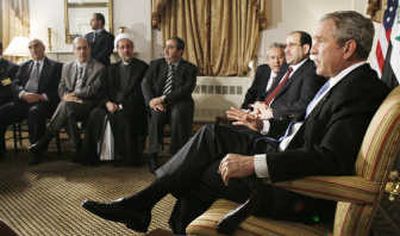Bush, Iraqi leader discuss tough issues

NEW YORK – President Bush and Iraqi Prime Minister Nouri al-Maliki met to discuss a range of thorny issues Tuesday but were unable to avoid the latest irritant in their relationship: a deadly shooting last week involving employees of Blackwater USA, a U.S. security company protecting American diplomats.
The talks between the two leaders took place during the ongoing meeting of the U.N. General Assembly and came as the government in Baghdad prepared legislation that would strip local and foreign security companies of immunity from prosecution.
During a 75-minute meeting in a suite at the Waldorf-Astoria Hotel, Bush and al-Maliki talked gingerly around the question of the role of private security companies in Iraq, according to a description by U.S. officials. A spokesman for al-Maliki, confirming the conversation, said the Iraqi leader cautioned against U.S. violations of Iraqi sovereignty.
“The forces operating in Iraq, including the security companies, should respect the sovereignty of Iraq,” al-Maliki’s spokesman, Ali Dabbagh, said by telephone from New York. “This is an issue which must be addressed in order to make the long-term relations between the U.S. and Iraq workable.”
The controversy stemmed from the shooting deaths of at least 11 Iraqis in Baghdad on Sept. 16, in which Blackwater employees were accused of firing without provocation. Bush had said last week that he would discuss the matter with al-Maliki when the two attended the U.N. meeting.
U.S. officials said the exchange was neither lengthy nor confrontational. Instead, there was “a general discussion of the importance of recognition of Iraqi sovereignty,” said Stephen Hadley, Bush’s national security adviser.
U.S. Secretary of State Condoleezza Rice and al-Maliki discussed the incident in greater detail after the formal meeting. The two countries are seeking better cooperation and coordination in security operations, while taking into consideration Iraqi sovereignty and the needs of protecting State Department personnel, Hadley said.
Contractors were granted immunity by an order signed by former U.S. administrator L. Paul Bremer III in 2004, in the waning days of U.S. authority over Iraq.
Bush also pressed Iraqi officials to make progress on a package of legislative measures intended to promote reconciliation across Iraq’s sectarian, ethnic and political divides. Passage of the provisions are part of the benchmarks set by the Bush administration as prerequisites for a future troop pullout.
“The political parties in Iraq must understand the importance of getting these laws passed,” Bush said during a photo session at the end of the meeting.
Al-Maliki said he had emphasized that “the future of Iraq goes through the gates of national reconciliations, of political agreements.”